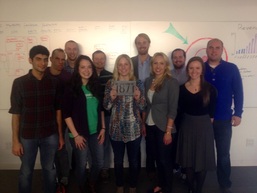Erik Severinghaus and his Startup SimpleRelevance are LEADING the Next Generation of Personalized Marketing
Erik wanted to create a way for companies to personalize their communication with customers and add some useful technology to help businesses optimize their e-mail marketing efforts. In early 2011, he founded SimpleRelevance with the mission of helping companies get the right message to the right customers.
Erik’s timing could not have been better. Not only was this B2B service riding the wave of data driven marketing, but it was benefiting from the startup boom taking over Windy City in the past few years. SimpleRelevance was one of the first companies to work out of Chicago’s famous 1871 co-working space, and it also utilized the Chicago branch of the highly selective startup accelerator Techstars to help refine the business and better serve its rapidly growing client base. In May of 2013, SimpleRelevance received $750,000 in Series A funding from Chicago based VC firm Hyde Park Angels.
The company is in the hands of an experienced and driven CEO. After spending nearly seven years climbing the ranks of IBM, Severinghaus founded three separate startups. Check out my interview with Erik to find out more about SimpleRelevance and his entrepreneurial journey.
 Founder/CEO - Erik Severinghaus
Founder/CEO - Erik Severinghaus Well - gaps naturally exist between areas of a company that has different goals. In the past, "technology" and "marketing" were very different animals, with different goals, tools, etc. It's only been in the past few years that at most companies IT has become a critical enabler of the business - and that means revenue (marketing). At the same time, marketing is becoming more data driven, requiring more and more technology to be effective.
When you think about it, technology has already gobbled up lots of other corporate departments. Operations is the most obvious, but finance, strategy, and other key areas are increasingly enabled by and dependent on technology. It's just that it's finally becoming "table stakes" for marketing.
Q: In working with all sorts of companies in various industries, what is the most common misconception or misunderstanding that clients have when it comes to e-mail marketing?
The most common misconception in the public is that e-mail marketing is dead or dying. Lazy journalists are constantly writing articles that essentially say, "my kids don't use email, they use [Facebook/Twitter/Snapchat/etc] and therefore email is dying." It's a facile argument that the data disproves time and again.
The most common misconception in the industry is that the status quo is "good enough." Because email continues to be such a profitable channel, many clients aren't spending the time or energy to keep improving it as a communication channel with their customers.
Q: What were some of the tough lessons you learned while running previous startups that has allowed you to avoid similar pitfalls or mistakes with SimpleRelevance?
I've learned more lessons than I can count. Probably the three most important:
1) Awesome technology doesn't mean anything if you can't get people to pay you to use it. Sales is often times much harder than building the product.
2) Nothing will kill a startup faster than strife within the core team. You have to have the best people, share a vision, and make sure to protect the team cohesion at all costs.
3) You're never as good as you think you are on the good days, and never as bad as you fear on the bad ones. Keep a cool head, and just keep moving forward.
 Erik and the SimpleRelevance team
Erik and the SimpleRelevance team Well, although we have technically graduated from 1871, we're still hanging out in the Techstars space under the same roof. As we do think about moving to a new space (and for all the real-estate folks out there - no I don't need help) I'm not really all that worried about it. Before the cool digs of 1871, we were on the 19th floor of the mart in a dilapidated space that was falling apart like you wouldn't believe. I've also had the privilege of leading teams in the corporate confines of IBM that were unbelievably innovative and we did some awesome things.
Culture is all about people and values. We stress core values all the time at SimpleRelevance, and I'm incredibly fortunate to be able to work with some of the best people imaginable. I think you could put us inside any set of four walls, and SimpleRelevance would remain a very special place to work.
Q: As CEO at one of the first companies to move into 1871, I’m curious to hear your thoughts on the shakeup at the top and the new CEO Howard Tullman taking a harder line on being more selective when it comes to admitting start ups into 1871.
I really can't say enough good things about Howard. The man has more energy and brains than just about anyone I have met. He's completely unscripted, and says exactly what he thinks.
I actually think a bit more of an "up or out" mentality is a good thing in the ecosystem. For the last few years, a lot of time and energy by fantastic people was put into creating an ecosystem that could catalyze and nurture early-stage innovation. There's more work to do there, but we're finally getting closer to critical mass. The next stage of our maturity as an ecosystem is to get these companies over the hump, and grow the startups into mature organizations.
Howard is going to give some folks "tough love" but in the end I think it will benefit everyone.
Q: Going through the TechStars Chicago program and utilizing local VCs and investors for funding, its clear that SimpleRelevance is a Chicago startup in every sense of the word. What is the biggest reason Chicago makes a great home for companies like SimpleRelevance to grow and thrive?
Yes, I think we really are the quintessential Chicago tech startup. Not only our affiliations and customers, but the fact that we're a revenue producing, b2b technology company. We're very proud of that, we love how easy it is to quantify the value that we create and bring to our clients.

 RSS Feed
RSS Feed
